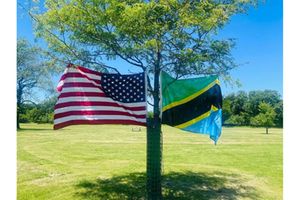Ethiopia deploys troops to quell ethnic violence

Ethiopia's military said Sunday it was deploying troops to quell violence between the country's two largest ethnic groups that has left hundreds dead in recent weeks.
The decision underscores persistent insecurity extending beyond Ethiopia's war-hit Tigray region ahead of national elections planned for June.
"A command post has been established in relation to the security problem that has occurred in North Shoa zone and Oromo special zone of Amhara regional state," the military said in a statement.
"The command post will help ensure the supremacy of the law on destructive forces that are disturbing the peace in these areas."
The Amhara region is dominated by the ethnic Amhara group -- Ethiopia's second-largest -- but the Oromo special zone is populated mainly by Oromos, the numerically dominant group.
Ethiopia's chief ombudsman, Endale Haile, told AFP earlier this month that the violence in Amhara had killed more than 300 people over several days in March.
Jemal Hassen Mohammed, chief administrator of the Jile-Temuga area in the Oromo special zone, said it began March 19 after an ethnic Oromo imam was shot dead outside a mosque, sparking clashes between Amhara security forces and ethnic Oromo civilians.
The Amhara Association of America, a US-based lobbying group, said more than 100 ethnic Amharas had been killed in North Shoa zone by members of the Oromo Liberation Army rebel group.
Further violence has been reported in the area as recently as this weekend, though updated casualty information was not available Sunday.
A command post is a military-led security structure deployed in regions rocked by unrest.
Command posts are currently found in at least two other locations: in Tigray, where Prime Minister Abiy Ahmed sent in troops in November to detain and disarm the regional ruling party, and in Benishangul-Gumuz, which has been the site of multiple grisly ethnic massacres in recent months.
Abiy is under mounting pressure to address the violence in Amhara and elsewhere.
"The government should deliver on its responsiblity to protect the people," the Ethiopian Human Rights Commission, the national human rights body, said in a statement Saturday.
The violence in Amhara has led to sniping between the Oromo and Amhara wings of Abiy's Prosperity Party, which have publicly accused each other of responsibility.
- June elections -
Abiy came to power in 2018 after several years of anti-government protests staged by Amhara and Oromo youth.
He won the Nobel Peace Prize the following year but his tenure has been marred by ethnic violence, and analysts warn that hotly anticipated national elections scheduled for June 5 could bring further insecurity.
They say the ongoing unrest could hamper efforts to organise the vote.
Birtukan Medeksa, head of the national election board, said Wednesday that insecurity had put a temporary halt to voter registration in several locations including the North Shoa and Oromo special zones.





